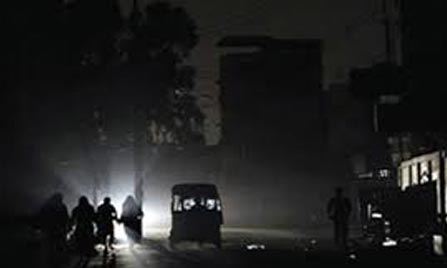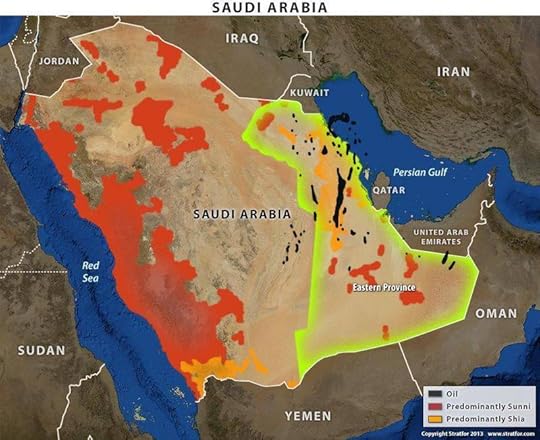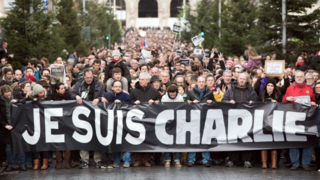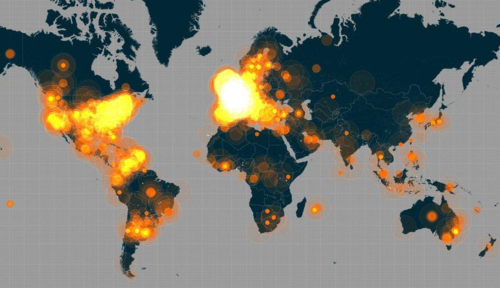John Robb's Blog, page 14
January 25, 2015
JOURNAL: Attack leaves 140 million people w/o power in Pakistan.
Militants toppled two transmission pylons causes a cascade of failure that plunged most of Pakistan (140 out 190 m people) into a blackout. Here's some insight into this:
Apparently, the attackers found a systempunkt. A systempunkt is the node in any network (physical or social) where it is the most vulnerable. An attack on a systempunkt can generate cascades of failure that take down the entire network. Its possible, although unlikely, the attackers knew this was the network's systempunkt when they destroyed it.
The success of this attack was largely due to the strain on Pakistan's grid. Pakistan's demand for electricity stands an estimate 14,000 MW, but it only produces 7,000 MW due to gross mismanagement, high debt, theft, fuel shortages, regulatory failure, etc. You name it. This shortfall has led to load shedding of up to ~15 hours a day already. As we know, when a complex network is operating at or near its capacity, it is many times more vulnerable to collapse and thereby much easier to attack.
This attack will prompt more attacks on the grid as other groups attempt to replicate the success it had. The reason is that militant groups in Pakistan (and across the world) use open source development to improve themselves. When an attack this simple and inexpensive yields outsized results, other groups will copy it in an attempt to do the same.
Attacks like these can be very damaging. How so? People don't blame the attackers for blackouts. They blame the government. In fact, the inability of a government to deliver the basics of energy and fuel is more damaging to its legitimacy than problems with security (it routinely led the list of reasons Iraqis were angry at the government).
JR
PS: It's easy to find systempunkts like this in the KSA as well as the USA.
January 24, 2015
Saudi Arabia's Kryptonite
If #ISIS can recruit people from nearly every country in the world, how well do you think it could do in Saudi Arabia if given an unfettered opportunity to do so…. If it can recruit French military personnel (including men from elite units), how would Saudi units fare?
The answer is that ISIS would do very, very well in the Kingdom. Here is why the Kingdom of Saudi Arabia (KSA) is vulnerable to a ragtag network like ISIS:
ISIS is an aggressively expansionist fundamentalist jihad. It kills, enslaves, or routs unbelievers, moderates, apostates, etc. wherever it finds them, which is the ultimate manifestation of Wahhabi fundamentalism.
Unfortunately for the KSA, this the same belief system underlying the legitimacy of the House of Saud and the same fundamentalism the Kingdom has spent the last century beating into the heads of their subjects.
This means that ISIS is moral kryptonite. A kryptonite built specifically to kill the Kingdom of Saudi Arabia. A kryptonite that breaks down the moral cohesion that binds the KSA together. A kryptonite that creates competitive centers of gravity that will rip the country apart.
A century ago, the House of Saud started a jihad to do exactly what ISIS is doing today. In that earlier case, the Saudi Ikhwan (a fundamentalist militia that is similar to ISIS) expanded until it conquered the territory that is now Saudi Arabia.
The Ikhwan eventually turned on the Sauds when they called an end to the jihad. The Sauds won that fight and spent the next century building a variant of Wahhabism to legitimize their rule. However, the Sauds never did eradicate the part Wahhabism that seeks expansionist jihad, and this will return to haunt them.
JR
Make room for Violence Capital
The jihadi entrepreneurs of ISIS don't just accumulate wealth and territory.
They are also accumulating violence capital.
What is violence capital?
In traditional businesses, money is the primary form of capital. In on-line businesses, network capital (the size of the network it controls or influences) is often more valuable than the financial capital it has. In the fluid world of jihadi entrepreneurship, violence capital is often most important form of capital.
Groups and individuals accumulate violence capital through the calculated application of violence. It's expended on the following:
Credibility and Reputation.
Coercive Influence.
Instant FUD (fear, uncertainty, and doubt).
Violence capital comes in lots of different forms and is expended in lots of different ways -- from the neighborhood bully to the petty mobster to petty tyrants to global superpowers to the Mongols (the unmatched, epic purveyors of violence capital).
Hopefully, you can see that it's a useful tool for thinking about the use and value of violence.
In the case of ISIS, the violence capital they are accumulating is of a special type. They are building their capital by:
killing,
enslaving, or
routing
any and all apostates, unbelievers, moderates, etc.
Why are they doing this? To become credible as an expansionist jihad within the fundamentalist Wahhabi tradition. A credibility can only be built with lots of violence capital.
JR
January 22, 2015
Abdullah is Dead. ISIS has an opportunity to flip the Kingdom. Here's how.
Last week I wrote that ISIS would attack Saudi Arabia this spring. This week the opportunity to attack with a high likelihood of success arrived: The King of Saudi Arabia died today. Unfortunately for the Saudi's, King Abdulla died before his Kingdom's gambit to gain control of ISIS paid off. Here's what they were trying to do but failed to pull off in time:
Saudi Arabia has been pumping oil like crazy to drive the price of oil down. It worked. Prices dropped. Lower oil prices are undercuting the funding ISIS gets from its illicit oil sales across the region.
Given time, the Saudis believed that this reduction in funding from oil sales would eventually force ISIS to approach Saudi Arabia for financial support. When it did ask for financial help, the Kingdom would be able to gain the leverage necessary to neutralize the threat it posed (as it did with al Qaeda decades earlier).
Needless to say, this gambit didn't work. ISIS proved much more resilient financially than al Qaeda and other non-state groups are. ISIS has many, many more sources of income than donations from sympathisers and oil sales.
The failure of this gambit means that with the death of the King, ISIS may have a golden opportunity to pivot south to take Mecca and Medina. A southern pivot would capitalize on the increased fragility (of an already fragile country) caused by the succession. It would also allow ISIS to continue the its impressive string of victories in the field. However, this won't be a conventional war. It's going to be an open source war to win a moral victory. Here's a taste for how they would do it:
ISIS would pivot forces from Syria and Iraq for a push south (indications are that this is apparently already underway), and then use these forces to rapidly overwhelm numerous border posts to create widespread confusion within the Saudi security forces. If done correctly, the rapid advances of black flags will cause a mass rout that will yield significant equipment and a considerable number of new jihadis (as troops flip to join the ISIS jihad).
Simultaneous with the drive south, cells of ISIS jihadis and lone sympathizers will activate across the Kingdom, causing disruption and confusion. With this, lines of authority and communication within the kingdom will begin to break down.
The advancing jihad will connect with local forces along a massive front moving south, jumping from city to city. The speed of this will depend on how willing the population is to accept ISIS. However, since Saudi Arabia has already indoctrinated its population with a religious ideology that is sympathetic to ISIS, the speed of the advance may be very rapid.
What will this attack on Saudi Arabia mean? Here are the worst potential outcomes.
The borders of Saudi Arabia might be completely rewritten within the next couple of months. >> Once humpty dumpty is broken, all the kings horses and all the kings men won't be able to put it together again.
In desperation, US ground troops would be deployed to defend the oil fields in the east (Ghawar, etc.). This deployment would radically increase the ability of ISIS to recruit and potentially turn this into a regional jihad.
The advance of ISIS would result in massive refugee populations of Shia (towards Iraq) due to a religious cleansing of towns and cities across the kingdom.
PS: If this doesn't occur, ISIS missed the opportunity, and we're all better off for their mistake.
PPS: ISIS is a theocratic network of networks that is both entrepreneurial and dynamic. The KSA is a theocratic hierarchy that's risk averse and inflexible. Which one wins?
January 20, 2015
Journal: Why ISIS is killing teen boys
Here's some interesting outliers. Information that isn't easy to parse. Over the last week, local ISIS forces have:
Publicly executed 13 teens in Mosul who were watching a soccer game (Iraq vs. Jordan).
Rounded up 15 teen boys for raising pigeons as a hobby in Diyala. They executed three of them and burned the birds.
Why did they do this? It wasn't just because they were being strict. The key to unlocking this is found in this simple statement:
"It distracted them from a focus on Islam"
In other words, these activities made it more difficult for ISIS is recruit these boys for jihad. So, by making the distractions and activities for teen boys prohibatively dangerous -- it makes peace boring.
PS: Indoctrination in the military and with cults begins by stripping all vestiges of normal life away until nothing is left but the ideology.
January 15, 2015
Saudi Arabia Plunges into an Abyss
Last week, just before the Charlie Hebdo attack, ISIS sent a suicide team across the border into Saudi Arabia. Here's what happened.
The attack was successful. The team found and killed the Saudi general (Oudah al-Belawi) in charge of the country's nothern border zone at the outpost he was visiting (here's a pic of the state funeral for some of the men killed in the attack).
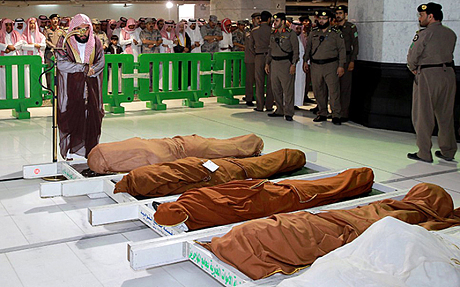
The target was significant. General Oudah al-Belawi was in charge of the multi-billion dollar Saudi effort to secure the northern border against ISIS. Not only has Saudi Arabia sent 30,000 additional troops to guard the northern border, it's building a highly automated 600-mi security wall to protect itself (lots of robots and sensors). Here's a great graphic of the monstrosity from the Telegraph. My take: What a waste of time and effort.
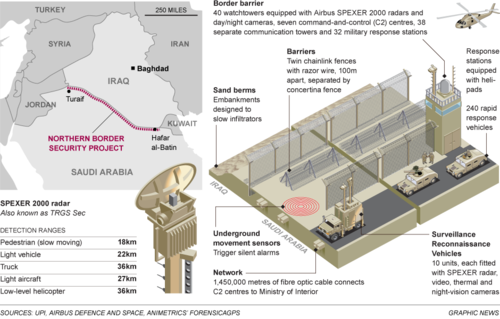
It demoralized the Saudi military. This attack deeply undermines the morale of Saudi troops on the border. If ISIS can kill a top general...
Saudi Arabia on the edge
Here why this attack is signficant.
It tells us that ISIS is starting to focus on Saudi Arabia --> with good reason. The reason is that there's simply no other way to unite the various groups under the ISIS banner. ISIS, like all open source movements, needs to keep moving in order to stay alive (like a shark). Right now, ISIS has stalled. A jihad to retake the holy sites from the corrupt regime in Riyadh can serve as a simple plausible promise that can reignite the open source war ISIS started, on a global scale.
The Saudis are vulnerable. The attackers knew exactly when the general was going to be at the outpost. This tells us that the Saudi military is rife with ISIS sympathisers and/or active members. If so, the Saudi military may melt away when facing jihadis (or switch sides) in the same way 30,000 Iraqi troops did early last year a couple of hundred miles to the north.
It explains the timing of Charlie Hebdo. Not only was it an attack that has gained ISIS favor with millions of Saudis (given how racist and anti-islamic the magazine's cartoons were), it was also (and more importantly) a distraction. It has successfully distracted the collective west, by pulling them into another "war on terrorism." This attack is something I call a Red Queen's trap, since it results in damage to both the contestants in the struggle.
What does this mean for Saudi Arabia?
Saudi Arabia knows it is in trouble, that's why the Saudis are trying to buy influence in the west through a cheap oil policy (at the same time, a low price puts the hurt on US frackers and ISIS oil smugglers alike). However, ISIS trumped this effort with Charlie Hebdo. It will be difficult for the Saudis to convince the west they are the real target after the attack in Paris. Here's what this means:
We're likely to see ISIS make a big push into Saudi Arabia this spring. This push may result in some very, very rapid gains by ISIS as Saudi troops melt away and/or join ISIS. The big question? If ISIS does gain a foothold: do the Saudi's accept foreign troops/airpower at the cost of their legitimacy, or do they go down fighting solo?
The oil price dip we're currently experiencing will rapidly reverse as soon as it's clear that ISIS is gearing up a real jihad to retake Mecca and Medina. $150 a barrel or more by the end of the year, once this gets going (or much more as it puts all of the gulf aristos in full panic mode simultaneously).
The rapid swing in oil price will plunge the perpetually stagnant western economies into a simultaneous rout. However, as bad as that will be, it will of little consequence compared to the damage the global financial system will do to us as hundreds of trillions of dollars in explosive financial derivatives topple the ziggurat of western debt we've so foolishly built.
January 13, 2015
Gone Data Gone
Here's a simple fact of life at the start of the 21st Century.
Every bit of unencrypted data, no matter where it is stored, has already been compromised or soon will be. Lost to theft, leak, or incompetence.
It doesn't matter how elaborate your procedures are. It doesn't matter how smart your techies are. It doesn't matter how careful you are.
There isn't an organization in the world that can truly protect it through new procedures, background checks, elaborate firewalls, new access controls, etc.
Anyone who says otherwise is a fool (fire them and save some money).
Even the NSA, the most secure organization in the world, has lost reams of critical data.
IF they can lose that much data, any company, agency, or person you do business with can or will lose similar amounts (or they already have).
Unfortunately, there's not a fix for this problem. It's only going to get worse.
Fortunately, there is a way to survive in the meantime. It's the approach the smartest people I know are using.
What is it?
Figure out what is important. There's only a small amount of critical data. Nominally protect the rest (most of it), but assume that it may be stolen, leaked, or spied upon at some point, so be prepared for that.
Encrypt the data that is important. Decentralize the encryption. Central controls and backdoors are vulnerabilities. Refresh that encryption as time goes on.
Shard all of the data. Break it up and spread it out over numerous computers (do it in a redundant way).
PS: Check out the EFF's Secure Messaging Scorecard for some insight on the best way to secure you communications. David Cameron, the Prime Minister of the UK, and his ilk in the US/EU want to prevent us from using encryption to protect ourselves.
PPS: A good way to avoid having to protect data? Be transparent. Run your organization in a transparent way. If you do that, there's nothing to steal.
January 12, 2015
EU Governments: Charlie Hebdo is a good excuse for War
The EU governments got together on January 11th to condemn the attack on Charlie Hebdo. However, they concluded that the best response is to curtail freespeech, ramp up propaganda, increase surveillance on citizens, and place a ban on the types of things Charlie Hebdo published.
Here's more detail. In their Joint Statement they concluded that:
The attack on Charlie Hebdo was a bad thing (very bold of them).
To protect free speech we must curtail it: "With this in mind, the partnership of the major Internet providers is essential to create the conditions of a swift reporting of material that aims to incite hatred and terror and the condition of its removing, where appropriate or possible." Force ISPs to shut down, spy on, or block access to websites deemed objectionable by EU ministries.
All members of the EU should increase their use of psychological operations and propaganda. In particular, the EU should use the "Syria Strategic Communication Advisory Team" (built on UK Home Office psyops expertise ) set up in Belgium when possible.
The EU should increase internal advertising to increase sensitivity to human rights and values of a diverse population (aka avoid the type of "hate speech" that Charlie Hebdo published).
The crack down of firearms should be intensified. Existing firearms laws didn't have any impact on this attack. The attackers were well armed. Perhaps more aggressive laws will fix that.
The EU should coordinate with the US on cyber initiatives to develop a more comprehensive way to track, screen, and detain global travellers.
PS: Clearly, the Red Queen isn't just leading France down the rabbit hole. David Cameron, not to be outdone, is using Charlie Hebdo as an excuse to introduce his "snoopers charter." It's a law that will ban private, encrypted communication in the UK (like what we see on snapchat and whatsapp).
PPS: Why is the EU responding this way? The EU is an organization composed of hollow states. Hollow states don't snoop on you to protect you. They snoop on you because they believe YOU are the enemy.
January 10, 2015
France Declares War on Islam
"It is a war against terrorism, against jihadism, against radical Islam, against everything that is aimed at breaking fraternity, freedom, solidarity... There needs to be a firm message about the values of the republic and of secularism." French Prime Minister Manuel Valls
Based on this statement alone, it looks like France is about to fall into a Red Queen's Trap. In this case, an all consuming struggle between an increasingly hollow nation-state and a large and growing population of people unwilling to assimilate. For example: here's a government list and atlas of the 751 "sensitive neighborhoods" like the one below that won't assimilate.
If this is a trap, here's what it is going to look like.
Since most nation-states aren't able to offer opportunity anymore (they are hollowing out due to globalization), this assimilation will be accelerated by rules, regulations, and force. In turn, these communities will resist this and seek support from outside (IS, etc.) for resisting, which will lead to more violence. More violence will lead to more government maladaptation -- largely due to the inherent weaknesses of a 21st Century hollow state -- and so on until great damage is done to everyone involved.
So, the big question is: Is France in a trap or not?
Let's dive in. Here are the interesting elements.
The attack wasn't a generic attack on a population center. It was very specific. It was an attack on French secularism, accomplished by passing judgement on the people who promote it. For example, the jihadis asked for specific people at the magazine by name when they arrived.
It was also interesting to me that the reaction to the attack was largely one of solidarity. People around the world showed support for the victims so much so that the #JeSuisCharlie (I am Charlie hashtag) has become the most popular hashtag in history. Here's a map of where it has been used (almost exclusively in the globalized "west"). Further, this solidarity movement is being used to generate massive rallies in Paris and around the world.
Based on this, there are two ways this could go.
If this solidarity is seen as merely support for an end to violence (which I believe it is), the entire thing will be largely forgotten in a week.
However, if it is seen as support for a new push to assimilate Islamic communities and promote secularist values, the Red Queen's trap is sprung.
The statement at the top of the page by the French Prime Minister -- this is a war -- is an indication that France may be in a trap.
PS: The US fell into a Red Queen's trap in 2001 that cost us thousands of lives, trillions of dollars, two lost wars, and most of our basic rights.
January 8, 2015
The Red Queen's Trap
The Red Queen's Trap is a paradox torn from the pages of Lewis Carroll's "Through the Looking Glass."
The Red Queen, in the book, uses it to explain how different her kingdom is from all the others.
She says:
"It takes all the running you can do, to keep in the same place."
Why is this paradox useful?
This paradox is the basis of a very interesting strategic trap. A trap that has destroyed organisms of all types, from nation-states to companies to industries to individuals to (for my purposes here) terrorist groups.
Interested? If so, read on.
The Red Queen's Race is good analogy for a destructive evolutionary struggle. It is what happens when competition between highly adaptable competitors gets out of control.
In the Red Queen's Race, every improvement one competitor makes is rapidly matched by the opposition and so on, forever. This struggle increases in intensity and frequency until one or the other competitor falls behind -- all the running you can do, to keep in the same place. When that happens -- finito.
So far, that sounds like a standard competitive struggle in the natural world, business arena, in warfare, or on the playing field.
However, the Red Queen is different than a normal competition. The Red Queen is destructive to both of the competitors. Here's how:
The Red Queen consumes all of the energy (adaptive capacity) of the both competitors for as long as it persists. No other adaptation is possible.
The Red Queen forces competitors to specialize to win this, and only this, competition. This specialization is almost certainly maladaptive -- it's of little use outside of the competition and of zero use when the competitor is dead.
An organism can get into a Red Queen's race with itself. Essentially, a competition that results in suicide.
I could spend days writing about this, but since this is being done on my dime, let's just spend a moment on number three.
Terrorism as a Red Queen's Race
How can an organism find itself in a Red Queen's Race with itself?
Traditional blood and guts terrorism results in a Red Queen's Race, in most instances. How so? Traditional terrorism seeks to create social disruption by making attacks that maximize body count or damage socially important symbols. This is done in order to coerce the targeted society or force the government into overreaction (or it's an marketing effort aimed at recruits/investors).
However, in almost all cases, blood and guts terrorist attacks do nothing of the sort and the attack doesn't evoke any meaningful effect. This is sometimes due to a deliberate policy wherein the government or society actively ignores the terrorists (as the poster suggests), or the attack just doesn't generate a significant amount of outrage (outrage is an art, not a science).
When the terrorist attack doesn't generate a response, the terrorist group is forced to make new attacks, bigger and more damaging than those in the past. In short, absent any meaningful response by the society and government it is targeting, the terrorist group will find itself in a deadly Red Queen's Race after the first attack.
Here's some detail.
A blood an guts terrorist attack is designed to evoke outrage and generate media coverage. Without that, it can't generate any meaningful effects.
However, with each subsequent terrorist attack, the amount of outrage and media coverage generated diminishes. This is due to the following factors:
The public becomes desensitized. People get used to it. They learn to live with it.
Media coverage follows the sensational. Routine or repetitive stories drop to the back pages.
Each subsequent attack (of the same level or less) generates fewer resources (financing, recruits, etc.). It also increases the pressure from law enforcement (attrition/self-defense) as they gather information on the group.
As a result of these diminishing returns, a terrorist group also finds itself in destructive Red Queen's Race with itself.
What does this mean? It's simple.
In order for a terrorist group to stay alive, every attack it makes must bigger than the one it previously made... more people dead... a bigger spectacle... a more revered symbol laid low.
It also means that the moment the group is unable to do that, it's dead. The moment it can't adapt fast enough to best its last adaptation, it will lose the resources it needs to survive increasing levels of law enforcement pressure. It was also lose relevance and fade into obscurity.
PS: See the excellent paper by Neil Johnson et. al. called "Dynamic Red Queen explains patterns in fatal insurgent attacks" Would love to see his data sets put into a deep learning network.
PPS: The Red Queen's Race can turn technological innovation into destructive, rather than constructive, change.
John Robb's Blog
- John Robb's profile
- 17 followers


